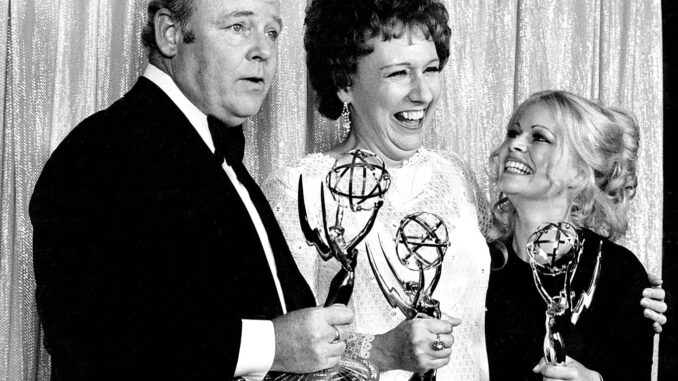
The Day That Changed Television Forever
There are few moments in television history that truly shifted the cultural landscape — and “All in the Family” delivered more than its fair share. On this very day in history, the groundbreaking sitcom didn’t just entertain—it challenged America to laugh, think, and confront its own contradictions. Let’s rewind the clock and revisit the day that cemented “All in the Family” as one of the most influential shows ever made.
The Birth of a Television Revolution
A Show Ahead of Its Time
When “All in the Family” first aired in 1971, it wasn’t just another sitcom—it was a social experiment wrapped in humor. The show’s creator, Norman Lear, dared to do what few others had attempted: use comedy to expose the raw truth about politics, race, gender, and generational divides.
Archie Bunker, the loud, opinionated patriarch played masterfully by Carroll O’Connor, became both a symbol and a mirror of American society. His views were outdated, sometimes offensive, but undeniably real for many households at the time.
The Episode That Sparked a Cultural Conversation
What Happened on This Day
On this specific day in “All in the Family” history, an episode aired that stirred up living rooms across America. Whether it was the topic of civil rights, feminism, or generational clashes, the show didn’t shy away from controversial themes. Audiences found themselves laughing one minute—and questioning their beliefs the next.
The Power of Bold Storytelling
Unlike most sitcoms of its era, “All in the Family” wasn’t afraid to ruffle feathers. It touched on taboo subjects like racism, war, and politics with a blend of satire and sincerity. That’s what made the show’s cultural commentary so timeless—it was raw, unfiltered, and unafraid.
Archie and Edith – The Heart of the Show
Carroll O’Connor’s Masterclass in Character
Carroll O’Connor didn’t just play Archie Bunker—he became him. His performance was layered, making Archie both the butt of the joke and a strangely sympathetic figure. Through Archie, audiences confronted uncomfortable truths about themselves and their world.
Jean Stapleton’s Edith – The Emotional Anchor
Edith Bunker, portrayed by Jean Stapleton, brought warmth and humanity to every scene. Her gentle heart and quiet wisdom often balanced Archie’s bluster. On this day in the show’s history, her lines resonated deeply—reminding viewers that empathy could coexist with disagreement.
The Social Impact of “All in the Family”

Breaking Boundaries in Prime Time
At a time when most sitcoms avoided controversy, “All in the Family” shattered the mold. It wasn’t afraid to say what everyone else whispered. It sparked national debates, forced uncomfortable conversations, and made television feel real for the first time.
Viewers Loved—and Loathed—It
Millions tuned in, not just for laughs, but for catharsis. Some cheered the show’s boldness. Others criticized it for crossing lines. But one thing was clear: nobody ignored “All in the Family.”
The Day’s Legacy in Pop Culture
When TV Became a Mirror
The episode that aired on this day was more than entertainment—it was a mirror reflecting America’s growing pains. It proved that television could be both funny and fearless, setting a precedent for future shows like “The Simpsons,” “Family Guy,” and “Modern Family.”
Inspiring Future Generations of Storytellers
Writers, comedians, and directors still cite “All in the Family” as a turning point in storytelling. It showed that the sitcom could be a vessel for truth-telling—not just laughter.
The Audience Reaction Then and Now
Letters, Protests, and Praise
Back in the day, network offices were flooded with viewer letters—some filled with outrage, others with admiration. But controversy only fueled curiosity. Ratings soared, and Archie Bunker became a household name.
How Fans Remember It Today
Today, rewatching that episode feels like stepping into a time capsule. The jokes might be dated, but the messages? Still shockingly relevant. Fans old and new continue to debate, laugh, and learn from it.
Behind the Scenes – Norman Lear’s Vision
Challenging the Status Quo
Norman Lear’s genius was his ability to blend humor and honesty. He didn’t just want to entertain—he wanted to enlighten. Every script was meticulously crafted to balance laughter with meaning.
How Lear Changed TV Forever
Before “All in the Family,” sitcoms were safe. After it, nothing was. Lear paved the way for socially conscious television—from “The Jeffersons” to “Maude” and beyond.
A Cultural Milestone Worth Remembering
Television’s True Turning Point
On this day in “All in the Family” history, TV grew up. It learned to tackle complex issues through comedy, proving that audiences could handle depth, honesty, and even discomfort—if delivered with heart.
The Legacy Lives On
The show’s impact can still be felt in modern television. Sitcoms today owe their freedom to push boundaries to the risk Lear and his team took decades ago.
Lessons We Can Still Learn Today
Humor as a Bridge, Not a Weapon
One of “All in the Family’s” most powerful lessons is that humor can unite, not divide. Even in disagreement, laughter offers understanding.
Courage in Storytelling
In an era of “safe” entertainment, “All in the Family” dared to be dangerous. That courage is something modern creators can—and should—emulate.
Why This Day Still Matters
Every time this anniversary rolls around, fans reflect on how “All in the Family” changed their view of what television could be. It wasn’t just a show—it was a social revolution, cleverly disguised as a sitcom.
Conclusion: A Day That Shaped TV and Culture
Looking back at this day in “All in the Family” history reminds us why the series remains iconic. It broke barriers, sparked national debates, and changed the DNA of American television forever. The episode that aired today wasn’t just about Archie Bunker’s living room—it was about our living rooms, our beliefs, and our willingness to laugh at ourselves while learning something profound.
The laughter may have faded, but the lessons endure.
